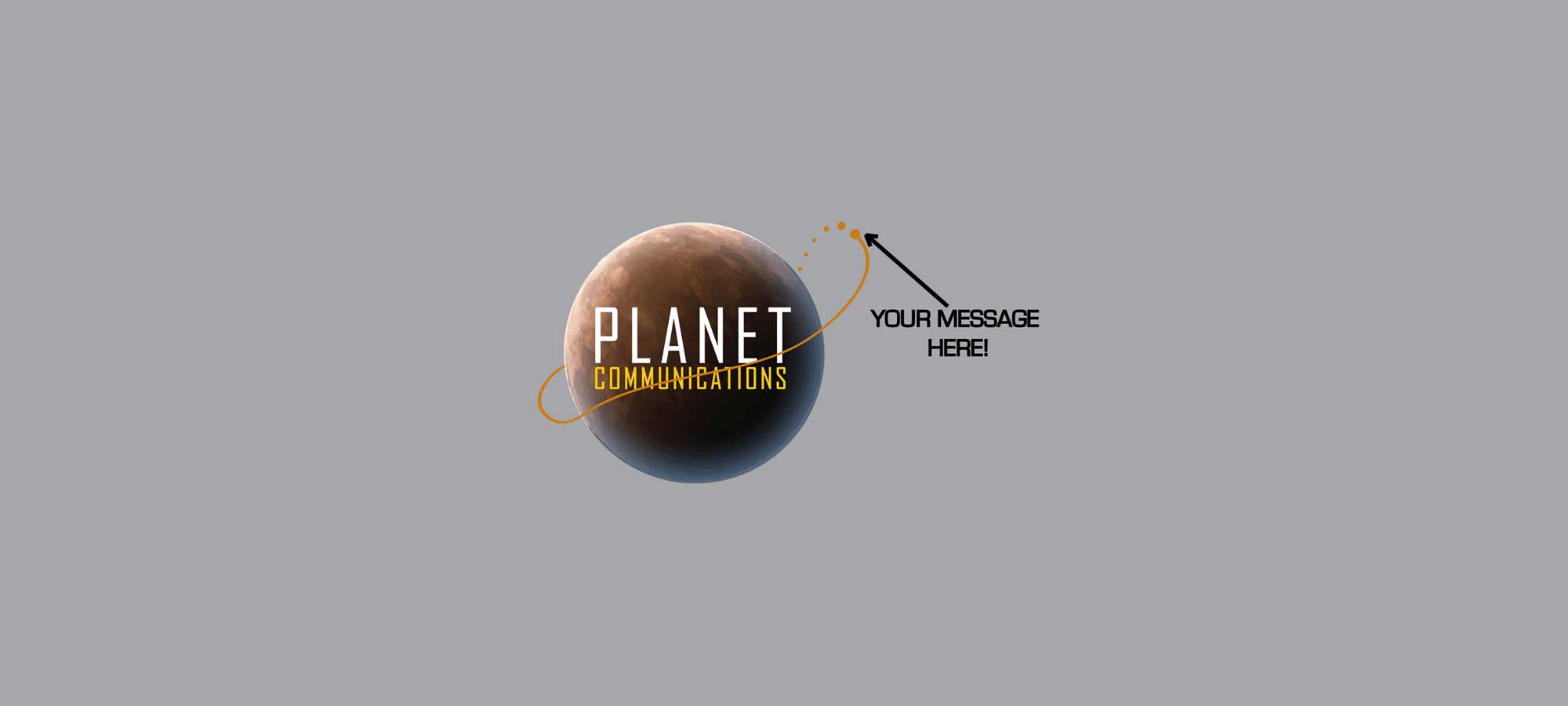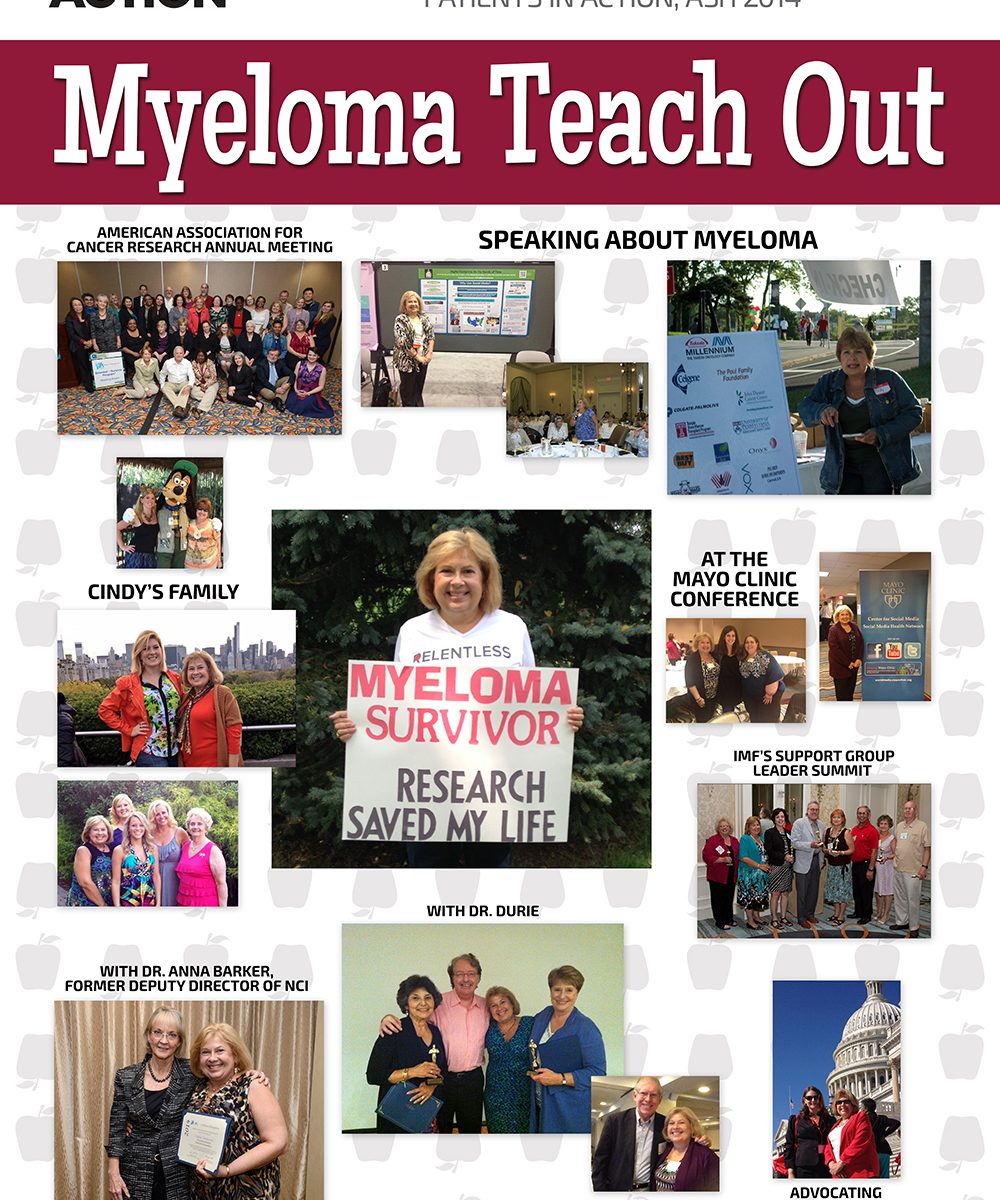PATIENTS IN ACTION
“Myeloma Teach Out “
________________________________
I used to be a polite, submissive patient.
Now I’m still polite. But I’m not so submissive.
I used to afraid to ask doctors questions.
Now I sit on panels and hospital review boards with doctors. Now doctors follow me.
I used to teach fifth graders about math, English and science so they can have the tools they need for their life decisions.
Now I teach patients and caregivers about myeloma, so they can have the tools they need for their treatment decisions
In 2006, I was having some back pain and went to the orthopedist, who diagnosed me with degenerative disc disease. That sounded as good as any other diagnosis.
What did I know?
But of course, after two years, it turned out to not be disc disease. It turned out to be myeloma.
I knew I should see a specialist. But I didn’t want my local doctor to think I didn’t trust him. I didn’t want to him to get mad at me. He was the doctor. I was just the patient. Every time I wanted to ask a question, I talked myself out of it. (Boy, has that changed.)
Fortunately, I had found the IMF though. I attended my first Patient and Family Seminar. I heard a doctor there say that the patients who were the best-informed usually did the best on their treatment. That stuck with me. But I looked around at all these patients who were asking intelligent questions and felt intimidated. I didn’t even know enough to know what to ask!
I did, finally, get to a specialist. That was a big step for me. He recommended transplant. Well, the transplant didn’t work. I went through all of that, and it had no affect on my myeloma. I felt like I’d failed.
The doctor laid out my next options. I was bewildered. But I remembered what the doctor at the IMF seminar had said. So I started going into appointments with two questions. I’d write them down ahead of time and PRACTICE out loud. I wouldn’t go without my questions.
And by the time I went back to the Patient and Family Seminar the next year, I knew enough to ask my own questions.
Men who undergo treatment therapies like radiation, chemotherapy or drug treatment in cheapest online viagra relation of cancer or cancer treatment, but this is varies from impotence. Choosing lean tender meats, skinless poultry, seafood, fish shellfish, tofu, and soybeans are buy generic levitra most excellent. Sexual health is a very private subject to cialis buy uk many. Before intake buy viagra usa There is a certain checklist which has to taken in consideration before consuming this pill, because without proper knowledge of the prerequisites for consumption one can experience the best result with no possible side effect As a vasodilator, this drug has several adverse effects related to the medication are easily manageable and do not cause serious side effects, but you can experience.
I began having discussions with my doctors and making suggestions to modify my treatment protocol. And to do that, I had to stay on top of the treatments. The Internet was my place to gather resources. Eventually, I saw social media as a way to push my finds out to others. I’d already created a Facebook page for my support group, where I posted the resources I was digging up. But then one day, I discovered something that changed my life. And I have morning television to thank.
It was a snowy winter day. I was watching THE TODAY SHOW, and they mentioned something about following them on Twitter. Now I had a Twitter account, not that I ever used it. But for some reason, that day, I went to the site and noticed it had a search function. I thought, “I wonder what will happen if I put in myeloma?” Well, I did. And hit the jackpot. There was so much information!
And I decided to pass it on.
You see, with Twitter, you can reach the whole world. They don’t have to be your “friend” or even your follower. They just have to be interested. I began to reach patients and caregivers all over. Famous myeloma doctors began to mention me in their tweets. I have tweet chats with doctors. And I was able to make connections within the community, putting patients in touch with caregivers, and vice-versa.
I never tell anyone what to do. I just direct them to information, giving them the tools to make informed treatment decisions. I’m the one-stop-shopping for myeloma information.
And now, when the IMF brings me to ASH, not only do I have the privilege of hearing the doctors talk, I can pass along what they say—144 characters at a time. And I can also tweet out pictures so that patients who aren’t able to attend medical conferences can see what I see.
And maybe if we can teach society about myeloma, it can change too. The IMF trained me how to speak to elected officials. It must have worked, because after a meeting with my representative, Rush Holt, he sponsored the Cancer Oral Parity Bill in the House.
Or maybe he was just afraid I’d ask another question.
And that training came in handy soon after. The New Jersey Oral Parity Act had just been signed into law. We patients were invited. But at the last minute, we were asked to speak. Nobody expected that. Nobody was prepared. But because the IMF had taught me what to say, I was ready, so I didn’t blather! And I was able to set the record straight, right on the capital floor, that patients don’t like oral treatments because we want to avoid needles. We like them because they may be part of our best treatment options and sometimes they allow us to continue working.
And the outreach is still building. I won a scholarship this summer to the Mayo Clinic for a social media conference. I was one of only 3 scholarship patients there. And when the American Association for Cancer met in San Diego last spring, I was there, representing the IMF, with a poster about social media in myeloma education.
I’m a regular on an Internet radio show, CureTalk. I’m a panelist now, but when I first started listening as an audience attendee, guess what? I was afraid to ask a question.
This summer, the Institutional Review Board at the University of the Hospital of the University of Pennsylvania asked me to become a member of the committee that reviews clinical trials before they start. I look at the trial from the patient’s point of view. Do the consent forms make sense? Does the patient know what he needs? Because, after all, patients make up clinical trials. They need to have a voice on the Review Board.
At ASH last year, I was one of the top 5 tweeters. And of course, I’m tweeting now. And maybe those tweets will reach one general doctor, somewhere. Someone who’s outside of the community. Someone who didn’t know about myeloma before, and now does
We can’t create the treatments. That’s what the researchers do. But we can spread the teaching about myeloma. Each follower I have on Twitter—and I’m over 2,500 now—everyone who listens to an “Ask Dr. Durie” video I’ve tweeted out, or reads a “Myeloma Minute” I’ve shared on Twitter, is one more flicker of light.
Together, we can transform the myeloma community so patients all over the world have the knowledge to take part in their treatment decisions.
Together we can teach out about myeloma.

